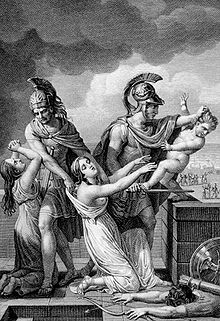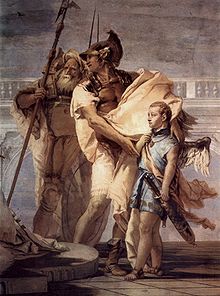Francus


Francus (French: Francion ) is the son of the Trojan hero Hector , who was first invented in the Middle Ages to the ancient Greek tradition, and the alleged progenitor of the Franks and French or the Franconian and French kings .
Mythical and literary fathers
According to ancient Greek and Roman mythology, Hector and his wife Andromache had only one son named Astyanax (nickname Skamandrios ), who was killed in the fall of Troy. Homer does not mention the end of Astyanax in his Iliad until the end of the 24th (last) chant, his death is instead described in Euripides ' tragedy The Trojans . Later tradition claimed that Astyanax was captured by the Greeks but then released and made king over a rebuilt Troy. As a new Troy called Virgil's Aeneid , however, by Helenus dominated and Hector's widow Andromache city Buthrotum (in Epirus); at Aeneas 'visit Andromache (saddened by Astyanax' death) sees in Aeneas son Ascanius the "image" of her prodigal son (III, 490). Helenos and Andromache instead had a son named Kestrinos , who is said to have become the progenitor of the Epirotian tribe of the Kestrinoi .
It was not until the early medieval chronicle of Fredegar that Francus first appeared as Aeneas' cousin or even brother around 660 . Independently of this, Francus was mentioned shortly afterwards in the Liber Historiae Francorum in connection with the legend of the Trojan descent of the Franks , which later found its way into the high medieval Grandes Chroniques de France . According to this, Francus escaped from Troy with Aeneas' help and reached the Danube to the Sicambrian Franks .
The Walloon Jean Lemaire de Belges (1513) described the supposed adventures of Francus for the first time in detail in his Illustrations de Gaule et Singularité de Troie , and shortly afterwards Johannes Trithemius also described the Franks as Trojan descendants in De origine gentis Francorum compendium (1514). According to Lemaire, Hector either had two sons (Astyanax and Francus) or Astyanax changed his name to Francus , settled on the Rhine ( Xanten ) or in Gaul and founded the city of Troyes on the Seine and the city of Lutetia in memory of Paris renamed.
La Franciade
Following Lemaire in particular, Pierre de Ronsard wrote the adventures of the Trojan prince. That of Ronsard his King Karl IX. The dedicated work, like the Iliad and the Aeneid, should include 24 chants. As once Fregard's concern, it was also Ronsard's, with a work on par with the Iliad and the Aenis , to create a descent myth for the French that was equal to the myth of the Trojan descent of the Romans and Italians. After the Portuguese Luís de Camões had published his Lusiads , Ronsard hastily published the first four chants as La Franciade in the same year (1572) , but he did not complete his work after St. Bartholomew's Night (1572) and Charles's death (1574) more. Amadis Jamyn later put together a short summary of the intended content of the remaining 20 chants by Ronsard.
- First chant : The gods decide to save Francus and send him to Gaul. Mercury brings the divine decision to Francus' uncle and foster father Helenos . The rest is busy preparing for the crossing.
- Second song : Neptune and Juno conspire against the divine plan, and the fleet is shipwrecked. Only six ships can escape the storm they caused and land on the Provencal coast. The local king Dicée (also Dicé , probably a descendant of Dike ) grants the castaways his protection. In gratitude, Francus frees Dicé's kingdom from a giant, whereupon Dicé gives him his daughter Hyanthe (Hyante, Hyacinthe) as a wife (according to other representations, the Gallic king was called Remus , while Hyanthe's father Dicé was the king of Crete, to which Francus had fled from Troy ).
- Third song : Dicé's other daughter, Clymene (Climène), is also inflamed with love and passion for Francus. When he rejects her, she throws herself into the sea.
- Canto four : Hyanthe, who has the powers of a seer, foretells Francus the future and shows him his future successors Pharamond and Merowech as Merovingian kings. Finally, the Carolingian Karl Martell is praised.
Alternative reading
The Franciade was the culmination of the Francus legend and ultimately its decline. Unlike the Lusus from Camoes' Lusiaden for the Portuguese, Francus was not the ancestor of the nation among the French. Not only did the Franciade remain unfinished, it was also considered one of his weakest works during Ronsard's lifetime. Since France's defeat in the Italian Wars (1559), the interest of the French kings in an invented equality of descent with Romans and Italians decreased , the actual descent of the French from the pre-Roman Gauls , postulated by Étienne Pasquier around 1560 , quickly became more popular.
According to a later reading, Hector and his son Francus were no longer real Trojans, but rather Gallic descendants of earlier Trojan emigrants. According to this, Hector was in command of a contingent of Gallic auxiliary troops, which King Bavo (Bauo), who ruled over the Belgian Gauls, had sent his cousin Priam, who was besieged by the Greeks, to support. After Hector was killed in the battle for Troy, Francus returned to Gaul with Trojan refugees and married the daughter of the Gallic king Remus there .
literature
- Wolfgang von Einsiedel: Kindlers Literature Lexicon in the dtv. Deutscher Taschenbuchverlag, Munich 1974, Volume 9, Page 3655 f.
- Michael Grant and John Hazel: Lexicon of Ancient Myths and Figures. Deutscher Taschenbuchverlag, Munich 1987, pages 77 (Astyanax) and 178 (Helenos).
- Friedrich Korn : Mythology of folk tales and folk tales. Scheible, Stuttgart 1848, page 1016 f .
- Joseph Wormstall : The origin of the Franks from Troy. To solve an ethnographic problem. Russell's, Münster 1869, pp . 54–56 .
See also
- Lusus and The Lusiads
- Britus or Brutus of Britain
- Hunor and Magor
- Čech , Lech , Rus and Choriv
- Antenor
- Qahtan and Adnan
